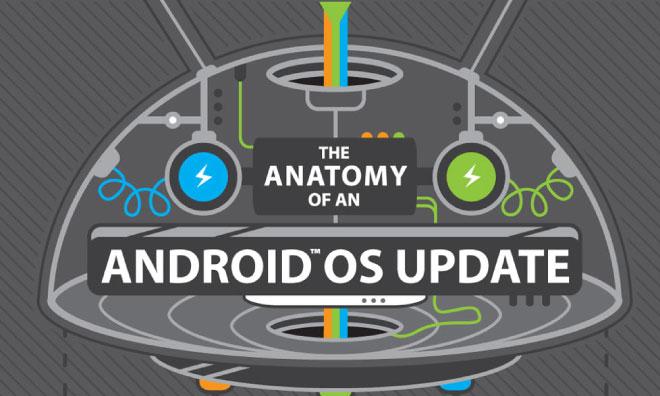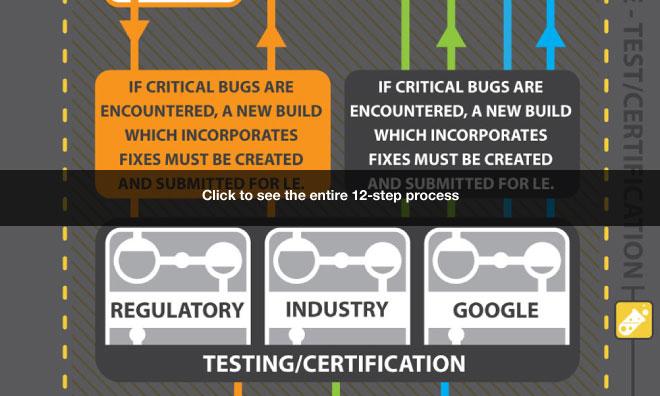Taiwanese smartphone maker HTC has shed light on the complex route Android updates must navigate before hitting customer devices, helping to explain why operating system updates take some time to arrive, and how, for some device owners, such updates never even arrive at all.
HTC has detailed the circuitous 12-step process as part of their Software Update status page, which tracks the company's progress in rolling out the latest version of Android to their flagship handsets. A monstrous 10,000-pixel-tall infographic walks readers the procedure, beginning when Google notifies the carriers of what they will include in Android's next version bump.
Before the update's public announcement, Google releases a "Platform Development Kit," or PDK, to its manufacturing partners. The PDK is essentially the hardware equivalent of a software SDK — Â it provides the tools necessary for device manufacturers to build Android-compatible hardware.
The update's source code is not released until after Google makes their public announcement, when it is shipped off to both handset manufacturers, like HTC, and chipset makers, such as Qualcomm, for evaluation. Both parties must agree to support the update before it can move forward, the first of several points at which the process can be derailed.No less than four stakeholders must agree in order for an Android update to run the gauntlet and make it to customer devices.
Chipset makers that elect to move forward with the update then begin the process of creating and optimizing new drivers for their hardware. It is up to each manufacturer to decide which chipsets will be targeted — devices using chipsets that do not make the cut, no matter their age, will be unable to run the newest Android version.
Until this point, the process is the same for all three classes of Android devices made by HTC — Â carrier devices, customized for and sold by carriers like Verizon Wireless; unlocked and developer edition devices, sold directly from HTC to customers; and Google Play edition devices, which run versions of Android unadulterated with carrier or manufacturer customizations. Once the chipset makers have had their say, however, each device follows a slightly different path.
For carrier and developer devices, the handset manufacturer can begin merging the Android and chipset updates with their existing code base. In HTC's case, this means integrating their HTC Sense user interface customizations.
Carriers then become involved, dictating which special applications, services, and carrier-specific modifications will need to be made. Google Play and developer edition devices are not subject to the carriers' whims, one reason why those handsets have already received their Android 4.4 "KitKat" updates while carrier phones have been forced to wait until 2014.
After internal testing, the updates are sent out for certification by carriers, regulatory bodies, and Google itself. Any of these players can delay the update and force changes to be made, but Google maintains final approval - without Mountain View's OK, the update will never see the light of day.
Apple, in comparison, faces a single stakeholder when it comes to iOS updates: themselves. They need only regulatory approval and technical certification from carriers — Â Apple famously released their cross-platform messaging service, iMessage, without consulting any of their carrier partners.
The effects of this dichotomy are illustrated by the latest version distribution statistics. Cupertino's newest operating system, iOS 7, now runs on more than three-quarters of all iOS devices, while Android 4.4 "KitKat" is found on a relatively miniscule 1.1 percent of devices, according to Google's developer dashboard.
 Shane Cole
Shane Cole








-m.jpg)






 Charles Martin
Charles Martin

 Malcolm Owen
Malcolm Owen
 William Gallagher
William Gallagher

 Christine McKee
Christine McKee
 Wesley Hilliard
Wesley Hilliard









55 Comments
If there are more insightful articles surfacing on the inner workings of Android, I wonder if their advocates will some day see the true colours of Android and understand why it is a failed product, in spite of it being copied from the best.
I'm not certain how accurate the process description is. Motorola has rolled out KitKat 4.4.2 in record time to it's MotoX and MotoG smartphones. Just three weeks after the formal announcement of 4.4 in the case of the MotoX (and Verizon of all carriers!). Maybe if some if some of the vendors didn't skin their devices so aggressively the updates could get completed quicker. Of course for some of the smaller licensees they may not care if their phone gets updated or not. :\ http://gigaom.com/2013/12/20/as-moto-g-gets-kitkat-motorola-becomes-a-nexus-maker-for-the-masses/
Sounds like one mighty cluster-frell.
Google is likely working on a true mobile OS, unlike Android, that does not piggyback on Linux. It'll probably run all current apps in a virtualization mode similar to when OS9 ran on OSX, or how Android runs on top of Linux.
It's inevitable, it's also the only way they will be able to clean up their act.
Observation:
Appleinsider, Google has managed to remove from Wikipedia references to the fact that the first Android demo looked liked BB and instead implied that Android, as it's known today, was developed in 2005. They also removed references to the fact that Android is a piggyback OS, much like Flash to a web-browser. The whole Wikipedia Android page reads like a commercial of heroism and conquest. Who has the Wiki credentials and good English to set some facts straight?
http://en.wikipedia.org/wiki/Android_(operating_system)
I'm not certain how accurate the process description is. Motorola has rolled out KitKat 4.4.2 in record time to it's MotoX and MotoG smartphones. Just three weeks after the formal announcement of 4.4 in the case of the MotoX (and Verizon of all carriers!). Maybe if some if some of the vendors didn't skin their devices so aggressively the updates could get completed quicker. Of course for some of the smaller licensees they may not care if their phone gets updated or not.
http://gigaom.com/2013/12/20/as-moto-g-gets-kitkat-motorola-becomes-a-nexus-maker-for-the-masses/
Motorola IS Google.. They got to bypass much of the process. They seem to be treating the update process like a Nexus for the most part.
Remember, Motorola has also been Verizon's pet for years, allowing Verizon to combat the iPhone with Android for all those years they didn't have an iPhone. Motorola has pushed DRIOD moniker on Verizon for some time and they likely know how to get through Verizon's BS approval process much quicker than other players..